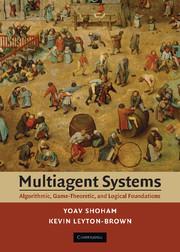Book contents
- Frontmatter
- Contents
- Credits and Acknowledgments
- Introduction
- 1 Distributed Constraint Satisfaction
- 2 Distributed Optimization
- 3 Introduction to Noncooperative Game Theory: Games in Normal Form
- 4 Computing Solution Concepts of Normal-Form Games
- 5 Games with Sequential Actions: Reasoning and Computing with the Extensive Form
- 6 Richer Representations: Beyond the Normal and Extensive Forms
- 7 Learning and Teaching
- 8 Communication
- 9 Aggregating Preferences: Social Choice
- 10 Protocols for Strategic Agents: Mechanism Design
- 11 Protocols for Multiagent Resource Allocation: Auctions
- 12 Teams of Selfish Agents: An Introduction to Coalitional Game Theory
- 13 Logics of Knowledge and Belief
- 14 Beyond Belief: Probability, Dynamics, and Intention
- Appendices: Technical Background
- A Probability Theory
- B Linear and Integer Programming
- C Markov Decision Problems (MDPs)
- D Classical Logic
- Bibliography
- Index
A - Probability Theory
from Appendices: Technical Background
Published online by Cambridge University Press: 05 June 2012
- Frontmatter
- Contents
- Credits and Acknowledgments
- Introduction
- 1 Distributed Constraint Satisfaction
- 2 Distributed Optimization
- 3 Introduction to Noncooperative Game Theory: Games in Normal Form
- 4 Computing Solution Concepts of Normal-Form Games
- 5 Games with Sequential Actions: Reasoning and Computing with the Extensive Form
- 6 Richer Representations: Beyond the Normal and Extensive Forms
- 7 Learning and Teaching
- 8 Communication
- 9 Aggregating Preferences: Social Choice
- 10 Protocols for Strategic Agents: Mechanism Design
- 11 Protocols for Multiagent Resource Allocation: Auctions
- 12 Teams of Selfish Agents: An Introduction to Coalitional Game Theory
- 13 Logics of Knowledge and Belief
- 14 Beyond Belief: Probability, Dynamics, and Intention
- Appendices: Technical Background
- A Probability Theory
- B Linear and Integer Programming
- C Markov Decision Problems (MDPs)
- D Classical Logic
- Bibliography
- Index
Summary
Probability theory provides a formal framework for the discussion of chance or uncertainty. This appendix reviews some key concepts of the theory and establishes notation. However, it glosses over some details (e.g., pertaining to measure theory). Therefore, the interested reader is encouraged to consult a textbook on the topic for a more comprehensive picture.
Probabilistic models
A probabilistic model is defined as a tuple (Ω, F, P), where:
Ω is the sample space, also called the event space;
F is a σ-algebra over Ω; that is, F ⊆ 2Ω and is closed under intersection and countable union; and
P : F ↦ [0, 1] is the probability density function (PDF).
Intuitively, the sample space is a set of things that can happen in the world according to our model. For example, in a model of a six-sided die, we might have Ω = {1, 2, 3, 4, 5, 6}. The σ-field F is a collection of measurable events. F is required because some outcomes in Ω may not be measurable; thus, we must define our probability density function P over F rather than over Ω. However, in many cases, such as the six-sided die example, all outcomes are measurable. In those cases we can equate F with 2Ω and view the probability space as the pair (Ω, P) and P as P : 2Ω ↦ [0, 1]. We assume this in the following.
Information
- Type
- Chapter
- Information
- Multiagent SystemsAlgorithmic, Game-Theoretic, and Logical Foundations, pp. 449 - 450Publisher: Cambridge University PressPrint publication year: 2008
